- Home
- Chaim Potok
The Promise Page 2
The Promise Read online
Page 2
Michael grinned delightedly as he watched us purchase our tickets. We came through the turnstile and climbed into the front seat of a car. The remaining seats filled rapidly. The teen-age boy who had taken our tickets shouted something to the man behind the ticket counter and pushed down a long lever set near the tracks. There was a faint hum of machinery. The car moved forward. Michael sat to my left, talking excitedly about the last time he had been on a roller coaster years ago in Coney Island. He had been scared half to death, he said, grinning at me and pushing the glasses back up on the bridge of his nose. Rachel sat to my right, looking a little frightened. The car climbed slowly up a steep incline. Then we were at the crest and with a suddenness that pushed me back against the seat and took the air from my lungs we dropped wildly into the night.
The car hurtled downward on roaring wheels between lights that blurred into quivering lines. Michael held on tightly to the support rod, his body rigid, his teeth clenched. Rachel gave me a resigned look. We rose and fell and rose again and fell again. On the ground below, the carnival heaved and undulated like a garish blanket in a windstorm. There were screams and shouts from the other passengers and the fierce crescendo of racing steel wheels. Michael sat with his eyes narrow against the whipping of the wind and his mouth open as though gulping the air that beat against him. Then, with an abrupt motion, he stood up in the car.
Immediately Rachel shouted at him to sit down.
He stood there, holding tightly to the rod, his body swaying with the wild motions of the car, and ignored her.
“Sit down!” Rachel screamed.
He turned his head and looked at her and laughed.
Rachel gave me a frightened, pleading look. I struggled to my feet and stood next to him, holding on to the rod and feeling my arms strain and pull against the sudden force of a drop that almost lifted me from the floor of the car. Then we were out of it and the tracks leveled and slanted off to the right and we seemed to be on our sides as we hurtled along the rim of the coaster over the booths and the lights and the asphalt road below. I heard Rachel shout at Michael again to sit down. He ignored her. We were climbing again. I turned my head to glance at Rachel. She was white-faced. I started to reach for Michael’s shoulder to pull him into the seat, but we had climbed to another crest and were falling again and I needed both hands on the rod. We fell a long time and I saw Michael release one hand from the rod and brush at his nose, then clutch quickly at the rod as the drop curved into a wildly slanting turn. I looked at his face. There was a faint dark smear on his upper lip. I saw him brush again at his nose, and now the smear was darker, moving liquidly across his face, and the wind lifted it and blew it against his cheeks and onto his shirt and out behind him into the night. We came out of the turn and straightened and dropped again down a long straight slope that looked like a ski jump, then looped upward into another climb. Michael stared at his hand. It had come away from his nose stained with blood. He sat down quickly.
“He’s got a nosebleed,” I shouted to Rachel above the noise of the wheels. I turned to Michael. “Lean back. Put your head back.” I took out my handkerchief and wiped away some of the blood. It trickled strongly from his left nostril, a dark stream against the whiteness of his narrow face.
“Press down on his upper lip,” Rachel said, shouting into the wind.
I put my forefinger across his upper lip and pressed down hard. Michael stared up at me. The next drop lifted my finger from his face and threw me against him, and I felt him squirming beneath my weight. Then I was sitting next to him, holding him and pushing down hard on his upper lip. He reached up and put both his hands on my arm and I thought he was using my arm to support himself in the seat, but he was pushing against me instead, pushing my finger away from his face. He took out his own handkerchief and held it to his nose, looking at me intently, a strange calm in his eyes. The car slowed, ran level for a moment, then came to a stop.
We climbed out. Michael held the handkerchief to his nose. Some of the passengers looked at him as they passed by. We moved away from the car and stood on the asphalt road near the roller coaster ticket booth.
“Are you all right?” Rachel asked him. Her voice was faint and she looked very frightened.
He took the handkerchief away from his nose. The bleeding had stopped. The handkerchief hung limply from his hand, stained with blood. He stuffed it into a pocket.
“What was that all about?” I said.
He grinned at me. There was a strange sly look on his narrow face.
“That was a stupid thing to do. What were you trying to prove?”
“I wasn’t scared,” he said, grinning. “I enjoyed it.”
“You scared hell out of me and Rachel.”
“Let’s play some more of the games,” he said.
Rachel said she wanted to go home.
“In a little while,” Michael said.
Rachel said she wanted to go home right now.
Michael ignored her. He was looking at the booths alongside the road beyond the roller coaster. Then he started on up the road, walking quickly, as if he were by himself now.
“He’s turning into a royal pain in the neck,” I said.
Rachel stood there, looking a little dazed and watching Michael go up the road.
“We should have gone home right away,” she said.
“Come on,” I said. “We’ll lose him in a minute.”
“We should have gone home right away,” she said again. Then she started quickly along the road. I walked beside her.
Up ahead, Michael had stopped in front of a small booth and was peering at it curiously. We came alongside him. The booth was about seven feet high and five feet deep and was built of wide planks. A single bare electric bulb hung by a black wire from the wooden ceiling. The shelves lining the back and side walls were filled with expensive, brightly colored radios, which had been carefully lacquered. On a shelf in the center of the rear wall was a large, brown-leather AM-FM short-wave radio trimmed in gold and with a gleaming silver antenna jutting upward from its side like a regal finger. It was a magnificent radio, and it sat as though enthroned amidst the smaller radios on the shelves.
The counter that fronted the booth was painted gold. Upon it lay a white wooden board and a brown-leather dice cup. The board contained ten rows of holes, ten holes in each row, one hundred holes in all. A number ranging from one to ten had been painted in black beneath each hole. The numbers appeared to be in random sequence and stood out sharp and black beneath the holes, the insides of which were bright red. The board glittered brightly in the harsh light of the electric bulb.
The three of us stood there, listening to the pitchman behind the counter. He was tall and thin, with skeletal features and dark, shiny hair brushed flat on top of his head. His dark eyes were narrow and lay in deep sockets beneath arching black brows. His fingers were long and white and thin, with bony knuckles and joints, and nails that looked manicured. He wore sharply pressed dark trousers, a white long-sleeved silk shirt, a red vest, and a red bow tie. His voice was strong, smooth, caressing. I saw him watching our faces intently as he explained the game.
It was a gambling game. The dice cup contained eight silver balls. The balls were tossed onto the board. The numbers below the holes into which they fell were added together. A card, which he now brought out and placed on the counter next to the board, was then consulted to determine the value of the total. As soon as the player’s separate throws added up to ten, he was given a radio.
“Can’t be simpler than that,” the pitchman said.
Michael stared at the large, brown-leather, gold-trimmed radio. He stood there, staring at the radio, his white shirt spotted with blood, his brown hair wild, his thin body taut. I saw him push his glasses up along the bridge of his nose and wet his lips.
“Look at it, Reuven,” he said.
“I’m looking,” I told him.
Rachel chewed her lip.
“I want to play,” Michael said.
<
br /> Rachel looked at him in dismay.
The pitchman smiled and ran his fingers over his red bow tie.
“It’s a gambling game,” Rachel said.
Michael ignored her.
“I don’t like gambling games,” she said.
“Then don’t play,” Michael said.
The pitchman leaned forward inside the booth and smiled at Michael. “I’ll tell you what I’ll do,” he said. “You like that big radio, right? It goes for twelve points. I’ll give it to you for ten. Same amount of points as a small radio.” His long fingers moved slowly across the gleaming leather and gold surface of the radio. “I don’t do that for everyone,” he said, still smiling. “But you look like a good kid. Ten points. How about it?”
“I don’t want you to play,” Rachel said.
Michael gave her an annoyed glance. He turned back to the pitchman, hesitated a moment, then looked at me and grinned.
“Reuven will play,” he said.
Rachel and I stared at him.
“It’ll be with my money. But I want Reuven to play.”
“No, thanks,” I said. “It’s your money, you play.”
“Is it all right if my friend plays with my money?” Michael asked the pitchman.
“Makes no difference who plays,” said the pitchman.
“You see?” Michael said. “It’s all right.”
“It’s not all right,” I told him.
“Look,” said the pitchman. “I’ll give you a free first throw. How about that?”
I did not say anything.
“What’ve you got to lose?” the pitchman asked. “A free first throw. You might even win it on that throw.” He had the dice cup in his hand now and was clicking the balls together softly. “Why don’t you go ahead and make the kid happy?” He clicked the balls together with his right hand and ran his left hand over his smoothly brushed black hair.
“I want you to play,” Michael said.
“I don’t gamble,” I said.
“I want you to play,” Michael said again. There was a hard, aggressive tone to his thin voice.
Rachel chewed her lip and said nothing.
“Play,” Michael said. I had the feeling I was being manipulated by him for some reason.
“It’s a free first throw,” the pitchman said.
“Play,” Michael said, his voice hard, almost ugly.
Rachel looked grim-faced but said nothing.
I took the dice cup from the pitchman and held it in my hand. I thought I would throw it once and get it over with. I had never held a dice cup in my hand before. I turned it over quickly. The balls scattered across the white board, five of them landing in holes, the remaining three coming to rest against the outer frame of the board.
The pitchman’s fingers moved swiftly over the board as he tallied up the numbers and nudged each ball from its hole. I had made a total of forty-three. The pitchman consulted the card. Number forty-three was worth five points.
“That’s pretty good,” the pitchman said. “You need five more points.”
“How much is it to play?” I heard Michael ask.
“Twenty-five cents a toss.”
I put the dice cup down on the counter. Michael dug into a pocket, came up with a crumpled dollar bill, and put it on the counter next to the board. The pitchman took the dollar bill and replaced it with three quarters. He put the balls back into the dice cup and looked at me.
“We’re going home,” I said.
“No we’re not,” Michael said. “We made five points for free.”
“Come on,” I said. “Let’s go.”
“I want you to play.”
“I told you I don’t—”
“I want that radio,” he said.
“Play by yourself then.”
“No,” he said. “I want you to play.”
I looked at Rachel. She seemed helpless.
“Play,” Michael said, picking up the dice cup and offering it to me.
“Go ahead,” the pitchman said. “Make the kid happy.”
“I want you to play,” Michael said, and pushed the dice cup into my hand.
“Why don’t you—”
“Play,” he said, his voice suddenly rising. “Dammit, play!”
I stared at him in surprise and felt him closing my fingers around the dice cup. For a moment I thought of simply turning and walking away, but I didn’t want to leave Rachel there alone with him. I glanced at her. She looked quite frightened now. I held the dice cup in my hand and with an abrupt and angry gesture spilled the balls onto the board.
“Thirty-five,” the pitchman counted swiftly, nudging the balls from the holes. He consulted the card and looked unhappy.
“What’s wrong?” I heard Michael ask.
“You make ten points, you get the radio and a fiver,” the pitchman said. He took a five-dollar bill from a cigar box on a shelf and put it on top of the leather and gold radio.
I stared at him. All of us stared at him.
“That’s the game,” he said, looking very unhappy.
“You mean we win the radio and the five dollars if we make five more points?” Michael asked.
“Yeah,” said the pitchman.
“You hear that, Reuven?”
“I hear.”
“It’s half a buck a throw now,” the pitchman said. “When it goes up like that, the toss goes up too.” He looked at me. “You playing?” He seemed quite willing to let the game end.
“He’s playing,” Michael said excitedly.
I tossed the balls onto the board.
The pitchman counted, nudging the balls from the holes, and consulted the card. I had made two more points.
Michael laughed. Rachel gave me an uncertain smile.
I tossed the balls again and made half a point. On the next toss, the five dollars Michael stood to win with the radio became ten dollars, and the cost of each toss went up from fifty cents to one dollar. I felt my annoyance at Michael begin to disappear, and I tossed the balls once again. The ten dollars became twenty dollars, and the one dollar became two dollars.
Michael put two dollars on the counter next to the lacquered board. I was playing seriously now and I clicked the balls together inside the dice cup and tossed them onto the board, then leaned forward, watching the swift count of the pitchman.
“Twenty-two,” he announced, nudging the last ball from its hole. He consulted the card, touched his tie, and ran his hand over his black hair. “One point,” he said. He glanced at the radio on top of which there now lay a new twenty-dollar bill. “You got a point and a half to go,” he added unhappily.
I saw Michael put two more dollars on the counter. There was a flush on his cheeks and his eyes burned hungrily. Glancing at Michael, I noticed a man standing near the booth, looking at us curiously. He appeared to be in his late sixties or early seventies, and he stood a few feet behind Michael, leaning on a cane and watching us. I clicked the balls together and tossed them onto the board. They scattered wildly across the lacquered surface, some finding holes, some falling against the frame. The pitchman nudged the balls from the holes as he counted, then consulted the card.
I had made an additional one-half point.
Michael laughed triumphantly and put two dollars on the counter. I had lost track of how much money he had spent so far, but I did not think it could be anywhere near what he stood to win.
I tossed the balls again. They added up to nineteen. The pitchman looked at the card.
“No credit,” he said, looking relieved.
The three of us stared at him.
“What do you mean, no credit?” I heard myself say.
“You want to look at the card?”
We looked at the card.
“All right,” I said.
Rachel put her hand on my arm and shook her head. I put the dice cup on the counter.
“You quitting?” the pitchman said.
Rachel ignored him. She looked at Michael. “You are going
to stop playing,” she said very quietly in Sephardic Hebrew.
I saw the old man give her a sudden sharp look.
“Rachel is right,” I said to Michael, also in Sephardic Hebrew. “You’re spending too much money.”
“It’s my money,” Michael responded in Hebrew. He put two dollars on the counter.
“Michael,” Rachel said, very quietly.
“It’s only one more point,” Michael said, in English now. There was a frantic edge to his thin voice.
Rachel took her hand from my arm. I had never seen her look so helpless. She was quite a strong-minded girl and I wondered why she didn’t simply grab Michael by the arm and drag him away from there. Instead she looked at the pitchman, as if pleading with him to stop the game. He stood very still behind the counter, saying nothing.
“Play,” Michael said loudly.
I had had enough.
“Reuven,” he said slowly.
“Play by yourself,” I told him. “And stop glaring. You look silly.”
He stared at me for a long moment. I saw his fists clenching and unclenching. I just stood there, staring back at him. Then, abruptly, he grabbed the dice cup and turned it over.
The twenty dollars became forty dollars, and the cost of each toss went up to four dollars.
Michael stared at the two twenty-dollar bills on top of the radio. He seemed dazed. Rachel said nothing. I felt myself beginning to sweat, felt beads of sweat on my back and beneath my arms. Michael took a five-dollar bill from his pocket and put it on the counter. The pitchman replaced it with a new one-dollar bill which he took from the cigar box on the shelf.
I looked at Rachel. She seemed unable to speak.
Michael picked up the dice cup and tossed the balls. The pitchman consulted the card.
“Double again,” he said, sounding surprised and very unhappy. “You two got a lucky streak going.” He put two more twenty-dollar bills on top of the radio. “That’s eight bucks a throw now. One more point, you win the radio and eighty bucks.”
The old man stood behind Michael, watching us curiously.
“I spent all my money,” I heard Michael say in Hebrew.
Rachel drew in her breath sharply.

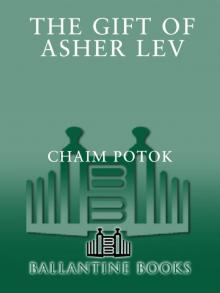 The Gift of Asher Lev
The Gift of Asher Lev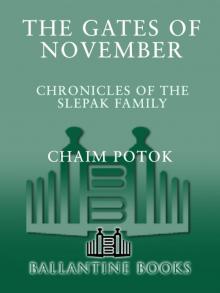 The Gates of November
The Gates of November In the Beginning
In the Beginning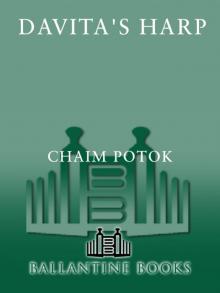 Davita's Harp
Davita's Harp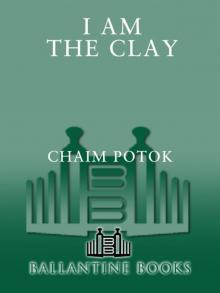 I Am the Clay
I Am the Clay The Promise
The Promise The Chosen
The Chosen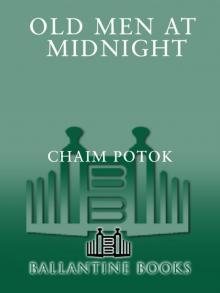 Old Men at Midnight
Old Men at Midnight My Name Is Asher Lev
My Name Is Asher Lev